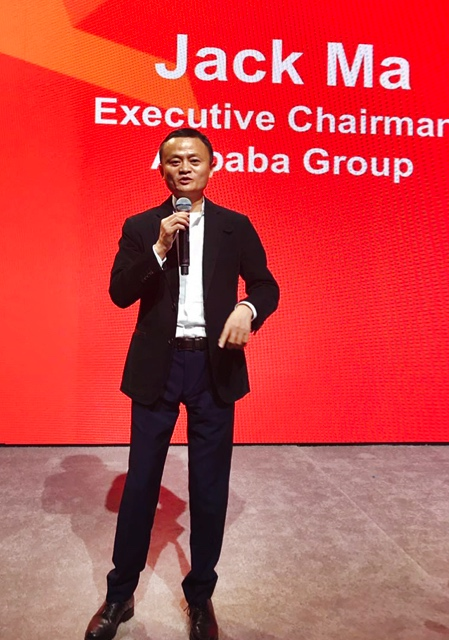The Fung Global Retail & Technology team is attending the Alibaba Gateway ’17 event in Detroit, Michigan. This inaugural conference, which attracted over 3,000 attendees, is the largest event Alibaba has hosted outside of China. Alibaba Gateway aims to help American businesses to better understand the China opportunity and enable them to sell into China via Alibaba’s various platforms. The company chose the city of Detroit for this inaugural event because the location is close to many small- and medium-sized businesses in the US.
Here are some key takeaways from Day 1 of the event.
1) According to Jack Ma, the Chinese Consumer Market Will Be the Global Economic Driver for the Next Several Decades; Alibaba Is Enabling the Globalization of E-Commerce
Jack Ma, the Founder and Chairman of Alibaba, believes that the biggest global economic driver for the next several decades is going to be the Chinese consumer market. Every American business should think about selling into China. He noted that in the past 20 years, the global economic driver has been the US consumer market, but he believes that will be replaced by the Chinese market.
Alibaba is at the center of enabling businesses to sell globally, which includes providing solutions for payments, logistics, financing and marketing. Ma noted that Alibaba focuses on enabling small- to medium-sized businesses because he believes they will become the main players of the next wave of globalization, which, over the past 20 years, has been undertaken by large corporations.
 Source: Fung Global Retail & Technology
Source: Fung Global Retail & Technology
2) Alibaba’s US Strategy Is to Help American Brands and Businesses to Tap into the China Market
Various Alibaba executives reiterated the company’s US strategy, which is to become the go-to platform for US businesses of all sizes to sell into China. It is part of Ma’s commitment to create 1 million jobs in the US. The company has been helping businesses through its e-commerce platforms Tmall and Taobao.com as well as its B2B sourcing platform Alibaba.com. As part of this commitment, the company has created a Q&A section on the Gateway event page to follow up with business attendees on questions about selling into China.
3) The Chinese Consumer Market Represents a Huge Opportunity for US Businesses
The Chinese consumer market is undergoing dramatic growth. In 2016, the Chinese retail market was worth $5 trillion, which is almost the same size of the US retail market. The number of middle-class consumers in China is projected to exceed 600 million in five years, according to McKinsey. The rising Chinese middle class has a large appetite for American brands. Over 60% of Chinese consumers would pay more for a product made in the US. In 2016, US products were the second-most-popular items on Tmall, Alibaba’s B2C platform.
4) Alibaba 101: Tmall and Taobao Are the Two-Most-Important Platforms for US Businesses Selling into China
Taobao.com and Tmall.com are two Alibaba-operated platforms that can enable US brands and retailers to sell into China. For small- to medium-sized business with little China experience, Taobao is the platform to supply to Alibaba’s wholesale partners who will distribute their products to China. For large brands, the branded marketplace Tmall offers an opportunity for brands and retailers to operate their own flagship stores on the site and leverage the large volume of traffic. Alibaba operates the world’s largest online shopping malls with more than 1.5 billion listings that reach more than half a billion Chinese consumers.
5) Ma’s Vision Is for Alibaba to Become an “Economy” that Enables Global Business Activity; Corporate Culture Is Critical to the Future of Alibaba
Ma’s describes Alibaba, not as a company, but rather as an economy in which business activities happen. He envisions Alibaba becoming a global platform enabling cross-border transactions. The sheer size of the company is similar to that of the world’s 21st-largest economy, Argentina, by value. For fiscal year 2017 (ended on March 31, 2017), Alibaba generated gross merchandise volume (GMV) worth $547 billion. Ma envisions that by 2036, Alibaba will be ranked independently as the 5th-largest “economy” after the US, China, the EU and Japan.
 Source: Fung Global Retail & Technology
Source: Fung Global Retail & Technology
Ma also shared the company’s corporate culture, which focuses on customers and employees. He emphasized that customers always come before shareholders. When a company is motivated to make its customers happy, it will generate value for its shareholders. He noted that healthy and happiness or “the double h” strategy is the key to attracting top-notch employees. According to Ma, top talent should not be managed by rules and regulations, but a shared vision.

 Source: Fung Global Retail & Technology
Source: Fung Global Retail & Technology Source: Fung Global Retail & Technology
Source: Fung Global Retail & Technology